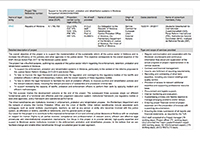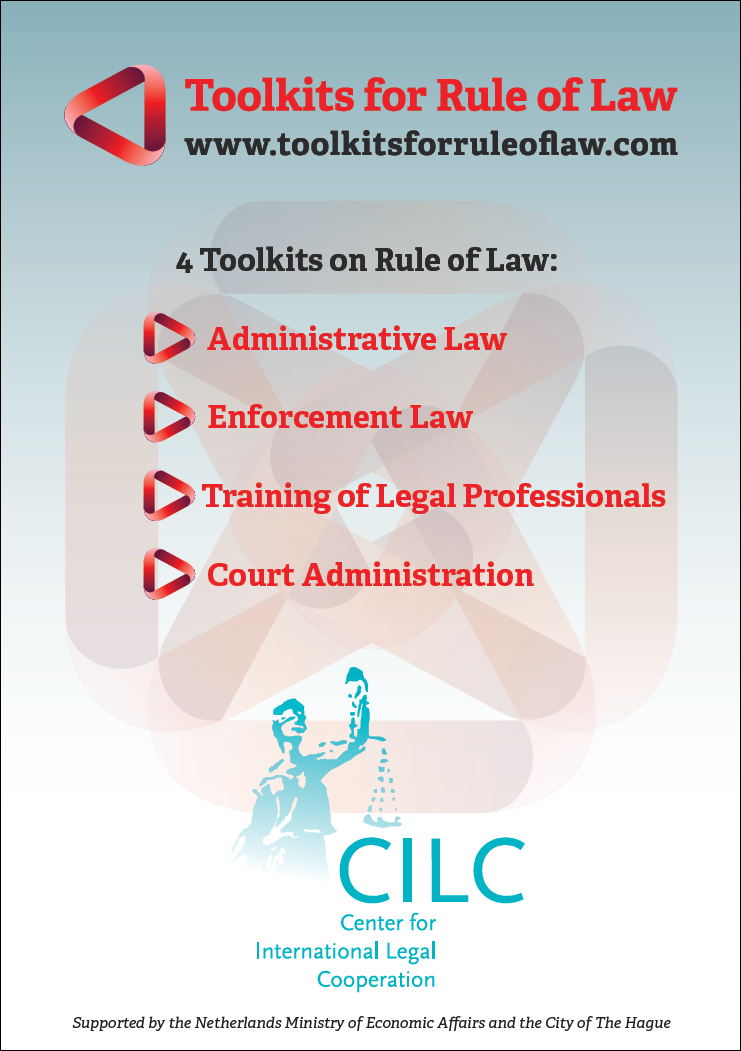
Netherlands: ongoing
Project description
Past projects from the Center for International Legal Cooperation in Eastern Europe, Russia and Central Asia aimed at modernising administrative law processes. The lessons learned and best practices from these and other projects were integrated into a toolkit that can be used to institute an administrative law system. The Toolkit Administrative Law is an online instrument supporting developments in administrative law. The Toolkit functions as a platform where visitors can search a database, receive advice applicable to their situation, study examples from other countries and gain access to experts in administrative law.
CILC has also assisted various Eastern European and developing countries in Court Administration. The Toolkit Court Administration addresses the system related to the management of the judiciary as a whole, as well as the management aspects of the individual courts and individual judges. It underlines the process of case-flow management from filing to closure and therefore includes the analysis of processes needed to support this function.
CILC has been involved in numerous projects for training of legal professionals in African and Eastern European countries. Supporting law faculties and judicial training institutes in modernising their education and training of legal professionals has played an important role in CILC’s focus on implementing and strengthening the rule of law. The Toolkit Training of Legal Professionals supports projects on curriculum development and training of legal professionals, focusing on management, staff development and infrastructure.
As part of judicial reform projects CILC has been involved in reshaping systems of ‘court-based’ enforcement into ‘out-of-court’ enforcement in many countries of the Balkans and Eastern Europe. The Enforcement Law Toolkit addresses the development and introduction of a non-public privatised system of enforcement.
Project team

Eric Vincken
Project Manager

Anna Demoed
Project Officer
Related news
- Co-creating Business Models for judicial innovations 26 August 2011On 18 August CILC as partner of Innovating Justice participated in a Co-Creation Event on Business Models for Justice. These cases covered a broad spectrum of areas for innovation: legal information and education, dispute resolution, courts and legislation. The event was organized in The Hague by Innovating Justice Over 50 participants with diverse backgrounds worked with the method ‘Business Model Generation’ to empower the following 5 innovations: CASE 1: Administrative Law Toolkit (CILC) CASE 2: CSR-related Conflict Management Facility CASE 3: European Academy for Law and Legislation CASE 4: Covering Costs of Court Fees CASE 5: Business Model for neutral legal aid aiming at low-income people CASE 1: Administrative Law Toolkit Administrative Law is a significant way to strengthen the Rule of Law. It regulates rights and duties between civilians and governmental authorities. It provides protection for citizens against governmental acts. Many transitional and developing countries have specifically requested administrative...
Read the full article
- Innovative Rule of Law Initiative: CILC toolkit 20 March 2011The Innovative Rule of Law Initiative (IRI) aims to address the static nature of the Rule of Law sector by stimulating, facilitating and improving (creating products and services for lasting) innovation in this domain. CILC contributes to this process by developing several toolkits, starting with a toolkit on administrative law for which the first research phase has almost been concluded. The research has led to interesting preliminary conclusions on innovative approaches regarding both the legislation process and the project implementation. These conclusions can be recommended in administrative legal reform projects. Concerning the drafting of administrative legislation, the method underlying the ‘Instalment law’ (in Dutch: aanbouwwet, the method applied during the adoption of the Dutch General Administrative Law Act) sees to the adoption of the administrative code in several clear-cut phases, starting with general principles and procedures. The ‘Instalment law’ method allows all stakeholders to oversee the global lines and issues related to the process...
Read the full article




